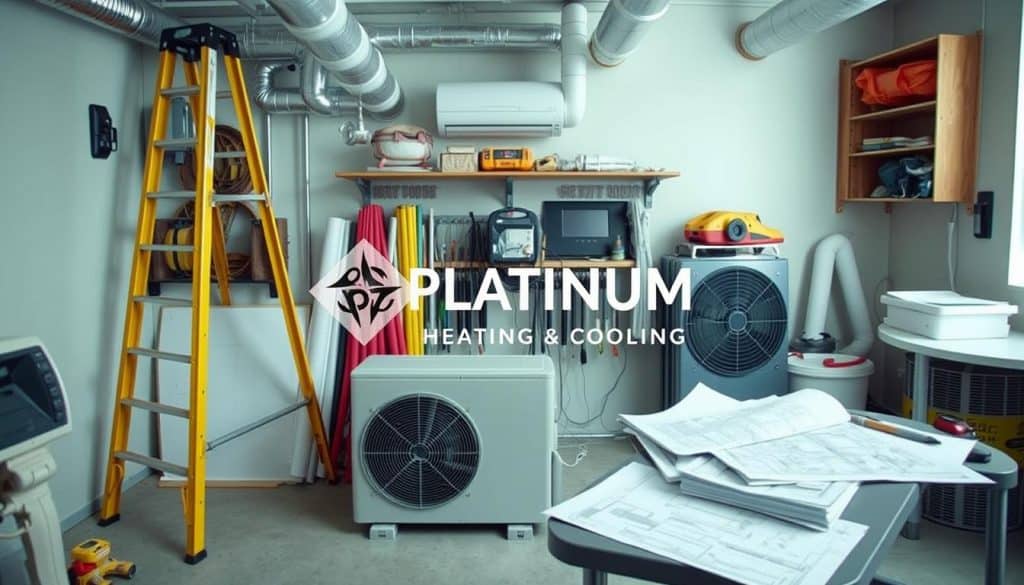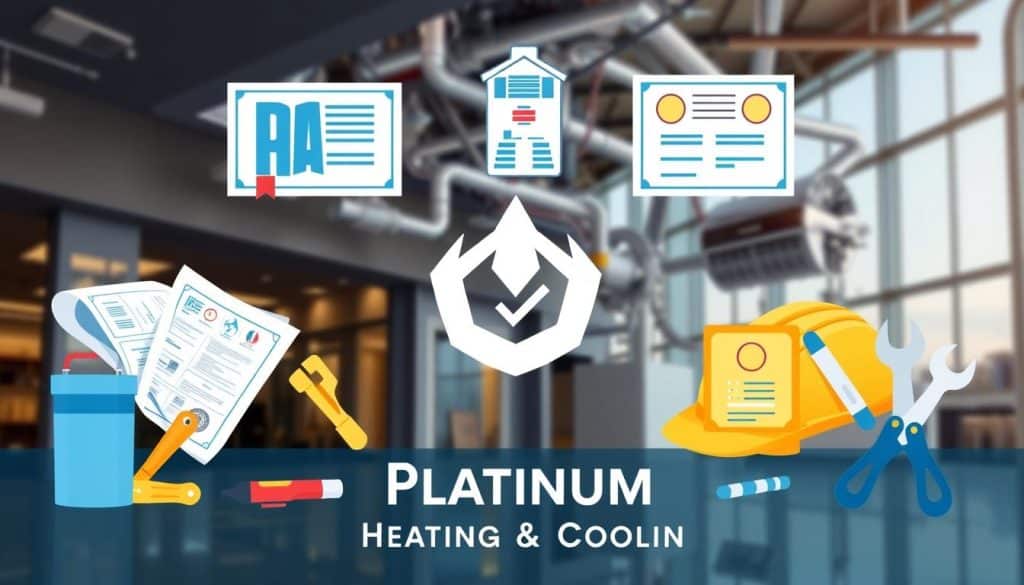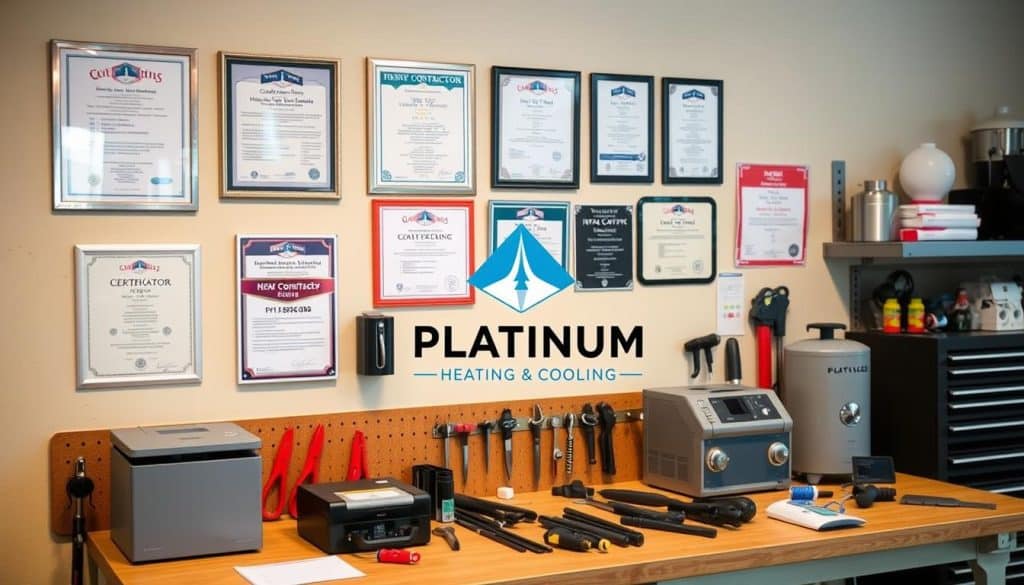Table of Contents
Thinking about What Permits are Needed for Commercial AC Installation? Getting the correct permits is key to follow local and state rules. Without the proper permits, you could face big legal, safety, and quality problems. Experts like those at Platinum Heating & Cooling know how to make sure everything is done right. They follow rules like the North Carolina State Building Code to protect your investment and keep your property safe.
Key Takeaways
- Commercial HVAC permits are mandatory for any heating or cooling system installation.
- Securing the appropriate permits ensures compliance with local and state building codes.
- Professional contractors can help navigate the commercial air conditioning permit process effectively.
- The absence of proper permits can result in legal issues, safety hazards, and additional costs.
- Understanding the HVAC installation requirements is vital for a successful and compliant installation.
Understanding Commercial HVAC Permits
In commercial construction, getting the right permits is key for safety and following rules. This is very important for HVAC systems. They need special permits for new setups, changes, or fixes. These permits make sure the work is done by experts and follows local codes.
What is a Commercial HVAC Permit?
A commercial HVAC permit is a special okay from local governments. It lets contractors or property owners do HVAC work in buildings. The main goal is to make sure the HVAC work meets state and local rules, safety, and building strength.
Why Are Permits Required?
Commercial HVAC permits prove that only licensed pros do the HVAC work. They protect the building and everyone in it. For instance, in North Carolina, a board checks who gets these permits. This ensures HVAC work is up to standard, like what Platinum Heating & Cooling does.
Also, a permit for HVAC installation shows the work meets safety and building rules.
Types of Permits for Commercial AC Installation
Commercial AC installations need various permits for safety and to follow local building codes. Knowing about these permits is key for a smooth process. Here are the main types of permits you’ll find.
Building Permits
Building permits are crucial for big construction projects, like installing commercial AC. They’re needed for any changes to the building for the new AC system. The application must show the work’s scope and how it affects the building to get approval.
Mechanical Permits
Mechanical permits cover the HVAC equipment’s installation. They check the system’s heating and cooling, its placement, and how well it works. Getting a mechanical permit makes sure the HVAC meets state and local rules, helping the installation process.
Electrical Permits
Electrical permits are for any electrical work with the HVAC system. They ensure the electrical parts are safe and meet building codes. A permit application for AC installation must include electrical plans for approval.
These different permits show how complex commercial AC installations are. That’s why businesses often turn to experts like Platinum Heating & Cooling for a smooth and compliant installation.
Steps to Obtain Commercial AC Installation Permits
Getting permits for commercial AC systems involves several steps. These steps make sure installations follow local rules and are safe and efficient. From applying to submitting documents and understanding costs and time frames, each step is important for getting permits.
Application Process
The first step is understanding the application process. You need to give local building authorities detailed project info. This includes technical details and system specs.
Working with experienced HVAC contractors like Platinum Heating & Cooling helps a lot. They know the rules and requirements well.
Required Documentation
It’s key to submit the right documents for permits. You’ll need technical drawings, system details, and proof of contractor license. Some places might ask for background checks or notarized documents.
Make sure all your paperwork is correct and complete. This avoids delays and shows you follow the rules.
Fees and Timelines
The cost and time it takes to get permits are important too. Fees vary by area and project complexity. Timelines include waiting for reviews, exams, and getting licenses.
In North Carolina, you might need a lot of experience to pass exams. This shows the need for careful preparation and support during the process.
Common Challenges in the Permit Application for AC Installation
Getting a commercial air conditioning permit can be tough for businesses. One big problem is dealing with different local rules. These rules can change what permits you need. Knowing your local rules well is key to avoid surprises during the permit process.
Local Variations in Regulations
In some places, like North Carolina, rules are the same everywhere. But, local areas can have their own rules too. This makes getting a permit more complicated. You might need extra papers and follow local building codes for HVAC, which can slow things down.
Delays and Inspections
Delays are common when applying for AC permits. They often come from needing lots of paperwork or slow local offices. Also, inspectors might need to visit several times to check everything meets standards. Working with skilled HVAC teams, like Platinum Heating & Cooling, can help avoid these issues. They can make the process faster and smoother.
What Permits Are Needed for Commercial AC Installation?
Figuring out what permits are needed for commercial AC installation means knowing that different permits might be required. This depends on the project details and the building’s location. Commonly needed permits include Building Permits, Mechanical Permits, and Electrical Permits.
Commercial HVAC installations need careful checks to follow local building codes and safety rules. Many commercial HVAC permits are crucial for a proper installation and safe operation. Getting these permits helps avoid fines and ensures the HVAC system works well.
A trusted HVAC company like Platinum Heating & Cooling helps find and get the needed permits. They make sure everything is done right, keeping the HVAC system in top shape. With the right permits, businesses know their HVAC systems are up to code, lasting longer and working better.
Commercial HVAC Inspection Guidelines
To ensure successful inspections, thorough preparation is key. Companies like Platinum Heating & Cooling follow strict guidelines. They focus on detailed inspections and follow-up actions.
Pre-Inspection Preparation
Before an inspection, it’s important to review installation details. Make sure the HVAC system meets local codes and manufacturer’s specs. This step helps spot potential issues.
What Inspectors Look For
Inspectors check for safety, proper installation, and code compliance. They look for issues like wrong wiring and poor airflow. These factors affect the system’s performance and safety.
Post-Inspection Procedures
After the inspection, fixing any problems is crucial. This might involve repairs or adjustments. Once fixed, getting final approval and keeping records is essential. These steps are vital for activating the license or permit.
Conclusion
Getting permits for commercial AC systems is key to following rules and keeping everyone safe. HVAC permits cover building, mechanical, and electrical needs. It’s important for owners and contractors to follow local and state laws.
Getting these permits right and on time can avoid legal and safety issues. This makes the installation process smoother.
It’s also crucial to follow detailed HVAC inspection guidelines. These help prepare for inspections and know what to expect. Working with experienced contractors like Platinum Heating & Cooling can make things easier.
They know a lot about HVAC rules. This partnership gives owners confidence in their HVAC systems’ reliability and long life.
If you need help with permits or want to learn more about HVAC inspections, contact Platinum Heating & Cooling. Call them at (616) 229-0444 or email office@platinumheatingmi.com. They can help make your HVAC projects run smoothly and efficiently.



